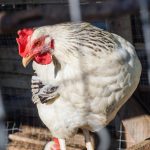Pecking behavior in chickens is a complex issue with multiple contributing factors. Poultry farmers must understand these causes to effectively manage and prevent this behavior. Overcrowding is a primary cause, as chickens kept in confined spaces may experience stress and exhibit aggression towards one another.
Insufficient resources, such as limited access to food, water, and nesting areas, can also lead to competitive pecking behavior. Chickens are intelligent animals that require mental stimulation. When kept in environments lacking enrichment, they may resort to pecking out of boredom or frustration.
This underscores the importance of providing appropriate environmental enrichment in poultry housing. Social dynamics within the flock also play a role in pecking behavior. Chickens naturally establish a hierarchical pecking order, and the introduction of new birds to an existing flock can lead to conflicts as they determine their positions within the group.
This process of establishing social hierarchy can result in increased pecking behavior. Understanding these underlying causes is essential for developing and implementing effective strategies to prevent and address pecking behavior in poultry farming. By addressing factors such as space allocation, resource availability, environmental enrichment, and flock management, farmers can promote better welfare and reduce the incidence of harmful pecking among their chickens.
Table of Contents
- 1 Providing Sufficient Space and Resources
- 2 Introducing New Chickens Properly
- 3 Implementing Environmental Enrichment
- 4 Monitoring and Addressing Aggressive Behavior
- 5 Using Anti-Pecking Products
- 6 Seeking Professional Advice if Necessary
- 7 FAQs
- 7.1 What are some reasons why chickens peck each other?
- 7.2 How can I prevent chickens from pecking each other?
- 7.3 What are some strategies for managing aggression in a flock of chickens?
- 7.4 Are there any natural remedies to prevent chickens from pecking each other?
- 7.5 When should I seek professional help for aggression issues in my chicken flock?
Key Takeaways
- Understanding the reasons behind pecking is crucial for addressing the issue effectively, as it can be caused by various factors such as stress, boredom, or overcrowding.
- Providing sufficient space and resources, such as nesting boxes, perches, and access to outdoor areas, can help reduce pecking behavior by minimizing competition and promoting natural behaviors.
- Introducing new chickens properly, by gradually integrating them into the flock and monitoring their interactions, can help prevent aggression and pecking.
- Implementing environmental enrichment, such as providing toys, dust baths, and varied terrain, can help reduce boredom and redirect aggressive behaviors in chickens.
- Monitoring and addressing aggressive behavior promptly is essential for preventing pecking from escalating, and seeking professional advice may be necessary if the issue persists despite interventions.
- Using anti-pecking products, such as bitter-tasting sprays or protective devices, can help deter pecking behavior and protect the welfare of the chickens.
- Seeking professional advice if necessary, from a veterinarian or animal behaviorist, can provide valuable insights and guidance for addressing pecking issues in a chicken flock.
Providing Sufficient Space and Resources
Providing Sufficient Space
One of the most important steps in preventing pecking behavior in chickens is to ensure that they have sufficient space and resources. Overcrowding can lead to stress and aggression among chickens, so it’s essential to provide them with enough room to move around comfortably. The general rule of thumb is to allow at least 2-3 square feet of space per chicken inside the coop, and 8-10 square feet per chicken in the outdoor run area.
Meeting Basic Needs
In addition to space, it’s crucial to provide chickens with an adequate supply of food, water, and nesting areas. Ensure that there are enough feeding and watering stations for all the birds in the flock, and that they are easily accessible to prevent competition and aggression. Providing multiple nesting boxes can also help reduce conflicts over laying areas.
Environmental Enrichment
Providing sufficient space and resources is not enough; it’s also important to offer environmental enrichment for the chickens. This can include providing perches, dust bathing areas, and objects for pecking and scratching. Enrichment activities help keep the chickens mentally stimulated and reduce boredom, which can in turn decrease the likelihood of aggressive behavior towards each other.
By creating a stimulating environment with plenty of space and resources, poultry farmers can help prevent pecking behavior in their flocks.
Introducing New Chickens Properly

When introducing new chickens to an existing flock, it’s important to do so carefully in order to minimize conflicts and pecking behavior. One effective strategy is to quarantine new birds for a period of time before introducing them to the main flock. This allows the new chickens to be monitored for any signs of illness or disease before they come into contact with the rest of the birds.
Quarantining also gives the new chickens time to acclimate to their new environment and reduces the stress of being immediately integrated into a new social group. Once the quarantine period is over, it’s best to introduce the new chickens to the existing flock gradually. This can be done by placing the new birds in a separate but adjacent enclosure so that they can see and hear each other without direct contact.
After a period of time, they can be allowed to mingle through a barrier such as chicken wire before being fully integrated into the flock. This gradual introduction allows the birds to establish their social hierarchy with minimal conflict, reducing the likelihood of pecking behavior. Another important aspect of introducing new chickens properly is to provide plenty of space and resources for all birds during the integration process.
This includes ensuring that there are enough feeding and watering stations, as well as nesting areas, to prevent competition and aggression. By taking these steps, poultry farmers can help minimize pecking behavior when introducing new chickens to an existing flock.
Implementing Environmental Enrichment
Environmental enrichment is an important aspect of poultry farming that can help prevent pecking behavior in chickens. Providing a stimulating environment with plenty of opportunities for natural behaviors such as perching, dust bathing, and foraging can help keep chickens mentally and physically engaged, reducing the likelihood of aggressive behavior towards each other. One effective way to implement environmental enrichment is by providing various objects for chickens to peck at and interact with.
This can include hanging vegetables or treats for them to peck at, as well as objects such as straw bales or hanging mirrors that provide mental stimulation. Additionally, providing perches at different heights within the coop can give chickens opportunities to roost and observe their surroundings, which can help reduce boredom and aggression. Another important aspect of environmental enrichment is providing opportunities for dust bathing.
Chickens naturally engage in dust bathing behavior to keep their feathers clean and free from parasites, so providing a designated area with fine dust or sand can help satisfy this natural instinct. By offering environmental enrichment activities such as pecking objects, perches, and dust bathing areas, poultry farmers can help reduce boredom and aggression in their flocks, ultimately minimizing the risk of pecking behavior.
Monitoring and Addressing Aggressive Behavior
It’s crucial for poultry farmers to closely monitor their flocks for any signs of aggressive behavior and address it promptly in order to prevent pecking. Aggression among chickens can manifest in various ways, including feather pecking, bullying, and even physical attacks. By regularly observing their birds’ behavior, farmers can identify any potential issues early on and take steps to address them before they escalate.
One effective strategy for addressing aggressive behavior is to separate any birds that are exhibiting aggressive tendencies from the rest of the flock. This can help prevent further conflict and give the aggressive bird time to calm down before being reintegrated into the group. Additionally, providing distractions such as extra enrichment activities or treats can help redirect aggressive behavior and reduce tension within the flock.
Another important aspect of monitoring and addressing aggressive behavior is to ensure that any injured birds receive prompt medical attention. Aggressive pecking can result in serious injuries such as open wounds or feather loss, which can lead to further health issues if not treated promptly. By addressing injuries quickly and providing appropriate care, poultry farmers can help prevent further aggression within the flock.
Using Anti-Pecking Products

Types of Anti-Pecking Products
There are various products available that are designed to deter chickens from pecking at each other. These include bitter-tasting sprays or ointments that can be applied to affected areas. These products work by making the feathers or skin taste unpleasant to the birds, discouraging further pecking. Another type of anti-pecking product is the use of protective devices such as hen saddles or aprons. These are small garments that are placed on the backs of affected birds to protect their feathers from being pecked by others.
Benefits of Protective Devices
Hen saddles can be particularly useful for preventing further damage to injured birds while they heal, as well as protecting vulnerable individuals from ongoing aggression.
Comprehensive Approach to Addressing Pecking Behavior
It’s important for poultry farmers to carefully consider the use of anti-pecking products and ensure that they are used in conjunction with other strategies for preventing pecking behavior. While these products can be effective in some cases, they should not be relied upon as the sole solution for addressing aggression within a flock. Instead, they should be used as part of a comprehensive approach that includes providing sufficient space and resources, implementing environmental enrichment, and monitoring and addressing aggressive behavior.
Seeking Professional Advice if Necessary
In some cases, poultry farmers may find it necessary to seek professional advice in order to effectively address pecking behavior within their flocks. If despite their best efforts, aggressive behavior continues to be a problem or if it escalates into serious injuries or high levels of stress among the birds, it may be time to consult with a veterinarian or animal behavior specialist. These professionals can provide valuable insights into the underlying causes of pecking behavior within a flock and offer tailored recommendations for addressing the issue.
They may also be able to provide guidance on implementing specific management practices or environmental modifications that can help reduce aggression among chickens. Additionally, seeking professional advice can be particularly important when dealing with severe cases of pecking behavior that result in injuries or high levels of stress among the birds. In these situations, a professional may be able to provide medical treatment for injured birds or offer specialized behavioral interventions that can help alleviate aggression within the flock.
In conclusion, understanding the reasons behind pecking behavior in chickens is crucial for implementing effective strategies to prevent and address this issue in poultry farming. By providing sufficient space and resources, introducing new chickens properly, implementing environmental enrichment, monitoring and addressing aggressive behavior, using anti-pecking products, and seeking professional advice if necessary, poultry farmers can create a harmonious environment for their flocks that minimizes the risk of pecking behavior.
If you’re looking for ways to keep chickens from pecking each other, you may also be interested in learning about what vegetables quails eat. Check out this article to discover the best vegetables to feed your quails and ensure they are getting the proper nutrition.
FAQs
What are some reasons why chickens peck each other?
Chickens may peck each other due to overcrowding, boredom, stress, lack of space, or nutritional deficiencies. It can also be a natural behavior for establishing a pecking order within the flock.
How can I prevent chickens from pecking each other?
To prevent chickens from pecking each other, provide adequate space, enrichment activities, and a balanced diet. Additionally, consider using anti-pecking sprays or applying deterrents such as pinless peepers or hen saddles.
What are some strategies for managing aggression in a flock of chickens?
Strategies for managing aggression in a flock of chickens include introducing new birds gradually, providing multiple feeding and watering stations, and separating aggressive birds if necessary. Additionally, ensuring a clean and well-ventilated coop can help reduce stress and aggression.
Are there any natural remedies to prevent chickens from pecking each other?
Some natural remedies to prevent chickens from pecking each other include adding herbs like oregano or garlic to their diet, providing access to dust baths, and using essential oils such as lavender or peppermint as a deterrent. However, it’s important to consult with a veterinarian before using any natural remedies.
When should I seek professional help for aggression issues in my chicken flock?
If aggression issues in a chicken flock persist despite implementing preventive measures, it’s advisable to seek professional help from a veterinarian or a poultry behavior specialist. They can provide guidance on managing aggression and ensuring the well-being of the flock.
Meet Walter, the feathered-friend fanatic of Florida! Nestled in the sunshine state, Walter struts through life with his feathered companions, clucking his way to happiness. With a coop that’s fancier than a five-star hotel, he’s the Don Juan of the chicken world. When he’s not teaching his hens to do the cha-cha, you’ll find him in a heated debate with his prized rooster, Sir Clucks-a-Lot. Walter’s poultry passion is no yolk; he’s the sunny-side-up guy you never knew you needed in your flock of friends!







